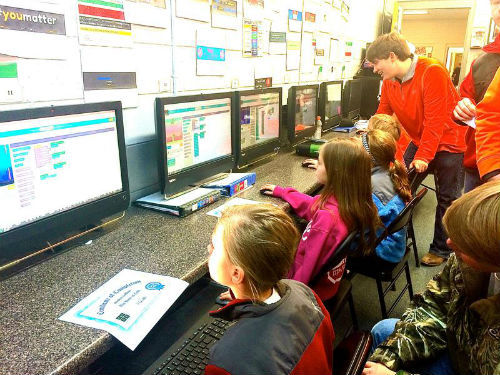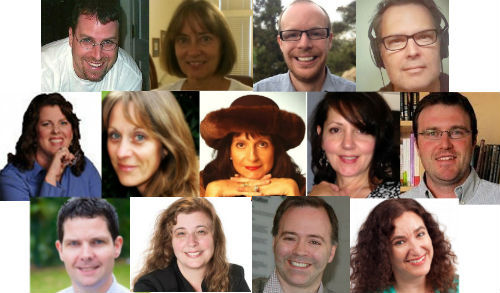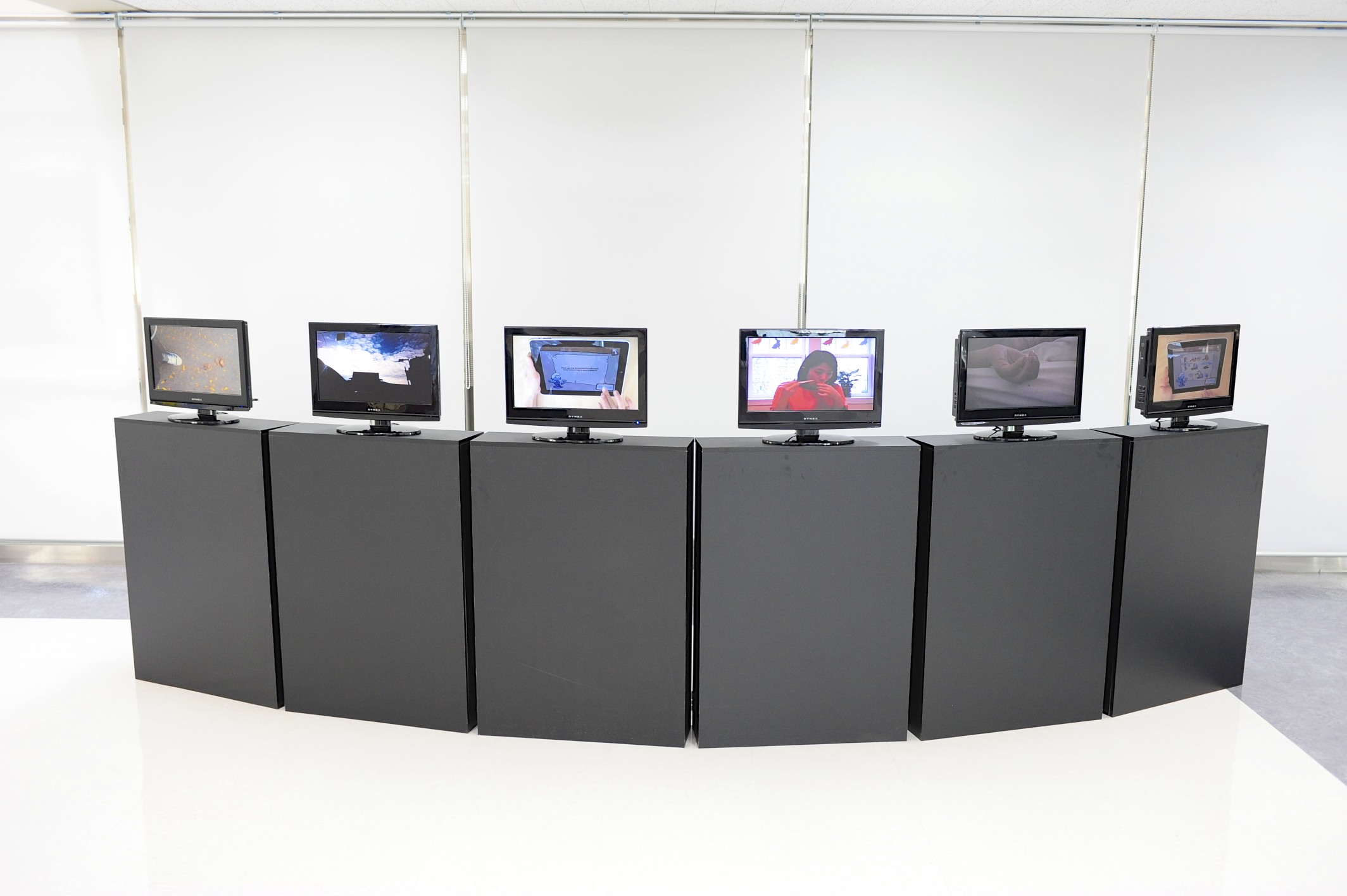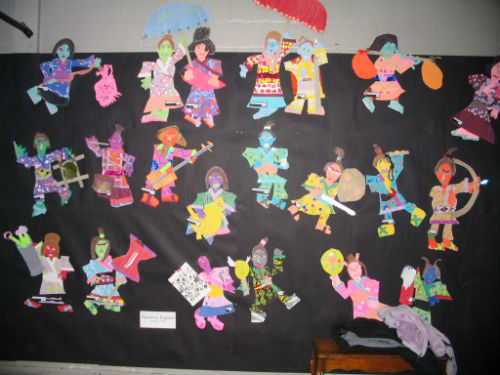
Joe Bower (joe_bower) from Canada points to a potential future mode of assessment. He has already swapped tests and grades in his classroom and replaced them with projects and performances collected in student portfolios. He still teaches for tests as much as he needs to but doesn’t let this overwhelm overall learning. More from Joe here.
Craig Kemp (mrkempnz) based in Singapore (which has a world-renowned education system, ranking 2nd on the PISA 2012 Lecture, Math and Science tests) says about testing that he has seen “the negative result of this pressure on students every day.” He talks about how the emphasis in his classroom is on learning through real world experience rather than on cramming for high stakes tests. À la fin, this helps students to excel across the board, since it encourages them to love learning. More from Craig here.
Angela Watson (@Angela_Watson) (recommended by Vicki Davis – coolcatteacher) warns us that “no matter how others may choose to evaluate your work, you can’t define your own success as a teacher according to whether students pass a standardized test. That’s a recipe for frustration and burnout.” Angela recommends focusing on the tried and true goals of working to make a difference and igniting passion. More from Angela here.
Karyn McWhirter (recommended by Pauline Hawkins – PaulineDHawkins) notes that “if an assessment is not a quality thinking/communicating task, then giving it to students is a waste of time.” She has found that preparing students for AP tests is helping them to learn analysis, argumentation, and communication. The problem for her is not with testing at large but the types of exams and what they are testing for. More from Karyn here.
Todd Finley (finleyt) believes “high-stakes standardized tests (HSSTs) undermine effective practice, especially when we treat testing as content rather than just one of many ways of understanding what learners need.” Todd shares his “test prep tips” but recommends that teachers trust their teacher-researcher brains by experimenting “with different test-prep activities, analyzing the results, and making creative adjustments.” More from Todd here.
Luke Reynolds (recommended by Adam Steiner – steineredtech) thinks students are “more than just test scores,” and hence focuses less on the test and more on overall classwork. He’s not sure if this is too idealistic, given the importance placed on testing elsewhere in the culture, but in the end, he expects that his students’ test scores won’t suffer. More from Luke here.
Richard Wells (iPadWells) based in New Zealand notes that the test prep playing field is out of whack, in favor of the middle class. This has to change, however it involves not just teachers and schools but also the government making changes – so we can move towards an environment of teamwork rather than competition. More from Richard here.
Bacon Chris (recommended by Adam Steiner – steineredtech) doesn’t have a magical answer. However he comments that “rather than teaching to the test, the most successful schools teach through the test.” Chris thinks that there are definitely ways to balance test prep with overall classroom needs. The key, il dit, is to emphasize critical thinking, even when doing test prep. More from Chris here.
Kelly Meehan (recommended by Adam Steiner – steineredtech) notes that as early as preschool, high stakes testing has inundated the curriculum in schools. She thinks we should be asking ourselves these questions: “What is the quality of the teaching and learning happening inside our classrooms? Is it the type of teaching and learning that is exploratory, engageant, and thought provoking? A type of learning that rewards risk and “mal” answers?” More from Kelly here.
Be sure to join us next month for another big picture question that our Top 12 Global teachers have the answer for.
Tom Bennett, Joe Bower, Susan Bowles, Lisa Currie, Vicki Davis, Todd Finley, Pauline Hawkins, Craig Kemp, Karen Lirenman, Adam Steiner, Silvia Tolisano, et Richard Wells sont La recherche globale pour l'éducation Haut 12 Enseignant blogueurs mondial.

(Photo courtesy of Vicki Davis)
Rejoignez-moi et leaders d'opinion de renommée mondiale dont Sir Michael Barber (Royaume-Uni), Dr. Michael Bloquer (États-Unis), Dr. Leon Botstein (États-Unis), Professeur Clay Christensen (États-Unis), Dr. Linda Darling-Hammond (États-Unis), Dr. MadhavChavan (Inde), Le professeur Michael Fullan (Canada), Professeur Howard Gardner (États-Unis), Professeur Andy Hargreaves (États-Unis), Professeur Yvonne Hellman (Pays-Bas), Professeur Kristin Helstad (Norvège), Jean Hendrickson (États-Unis), Professeur Rose Hipkins (Nouvelle-Zélande), Professeur Cornelia Hoogland (Canada), Honorable Jeff Johnson (Canada), Mme. Chantal Kaufmann (Belgique), Dr. EijaKauppinen (Finlande), Le secrétaire d'Etat TapioKosunen (Finlande), Professor Dominique Lafontaine (Belgique), Professeur Hugh Lauder (Royaume-Uni), Seigneur Ken Macdonald (Royaume-Uni), Professeur Geoff Masters (Australie), Professeur Barry McGaw (Australie), Shiv Nadar (Inde), Professeur R. Natarajan (Inde), Dr. PAK NG (Singapour), Dr. Denise Pape (États-Unis), Sridhar Rajagopalan (Inde), Dr. Diane Ravitch (États-Unis), Richard Wilson Riley (États-Unis), Sir Ken Robinson (Royaume-Uni), Professeur Pasi Sahlberg (Finlande), Professeur Manabu Sato (Japon), Andreas Schleicher (PISA, OCDE), Dr. Anthony Seldon (Royaume-Uni), Dr. David Shaffer (États-Unis), Dr. Kirsten immersive, (Norvège), Chancelier Stephen Spahn (États-Unis), Yves Thézé (LyceeFrancais États-Unis), Professeur Charles Ungerleider (Canada), Professeur Tony Wagner (États-Unis), Sir David Watson (Royaume-Uni), Professeur Dylan Wiliam (Royaume-Uni), Dr. Mark Wormald (Royaume-Uni), Professeur Theo Wubbels (Pays-Bas), Professeur Michael Young (Royaume-Uni), et le professeur Zhang Minxuan (Chine) alors qu'ils explorent les grandes questions d'éducation de l'image que toutes les nations doivent faire face aujourd'hui.
La recherche globale pour l'éducation communautaire page
C. M. Rubin est l'auteur de deux séries en ligne largement lecture pour lequel elle a reçu une 2011 Upton Sinclair prix, “La recherche globale pour l'éducation” et “Comment allons-nous savoir?” Elle est également l'auteur de trois livres à succès, Y compris The Real Alice au pays des merveilles, est l'éditeur de CMRubinWorld, et est une fondation perturbateurs Fellow.
Suivez C. M. Rubin sur Twitter: www.twitter.com/@cmrubinworld






Commentaires récents